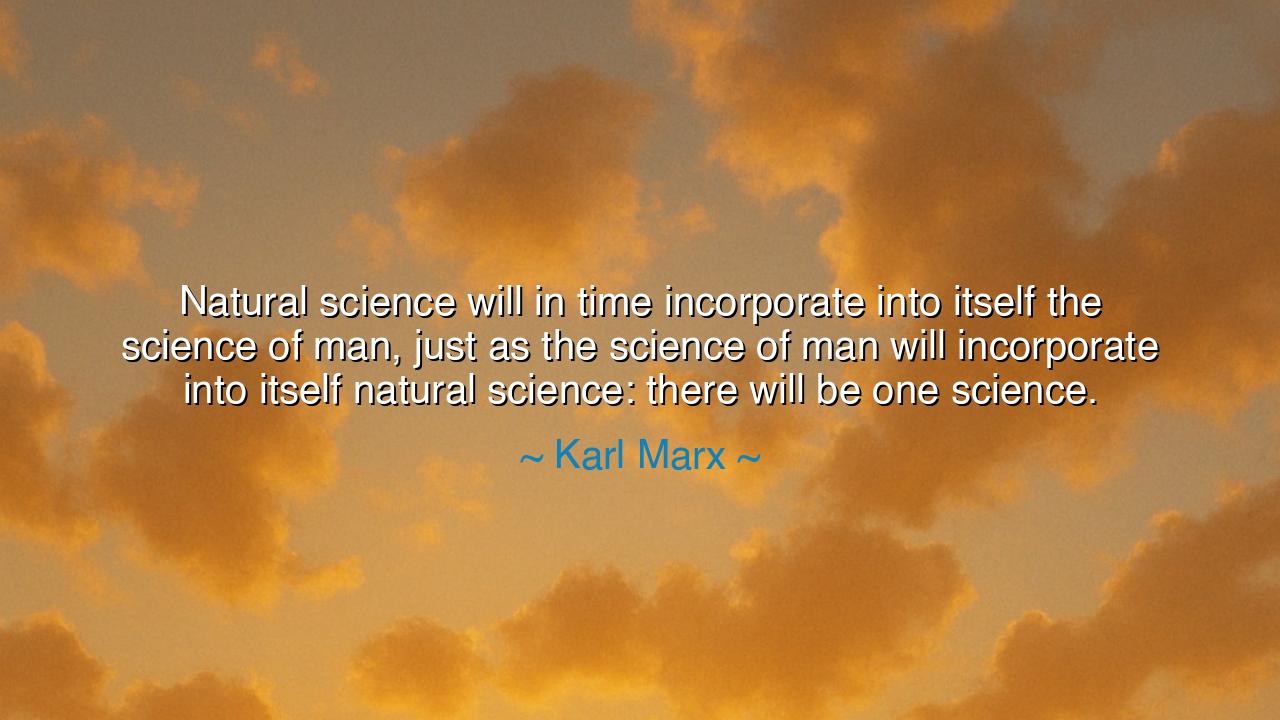
Natural science will in time incorporate into itself the science
Natural science will in time incorporate into itself the science of man, just as the science of man will incorporate into itself natural science: there will be one science.






Hear now, O children of wisdom, for the words of Karl Marx contain a vision of unity, a vision that sees the natural world and the human experience as deeply intertwined. "Natural science will in time incorporate into itself the science of man, just as the science of man will incorporate into itself natural science: there will be one science." In these words, Marx reveals a profound truth about the future of knowledge—a future where the study of nature and the study of humanity are no longer separate, but come together in a unified vision of the world. What was once seen as two distinct realms, one governed by the laws of the physical world and the other by the complexities of human behavior, will eventually merge into a single science, a science that sees the human being as both a part of nature and an agent of change within it.
In the ancient world, O children, the philosophers of old sought to understand both the heavens and the earth, the divine and the human. Plato spoke of the Forms, the eternal truths that govern both the physical and metaphysical realms, while Aristotle sought to categorize all things in the natural world, from the stars in the heavens to the animals that walked upon the earth. These thinkers understood that knowledge was a vast and interconnected web, where the study of one thing inevitably led to the study of another. Yet, even they could not fully bridge the gap between the study of nature and the study of the human condition. The ancients recognized the importance of understanding both, but they still viewed them as two separate fields—natural science and human science—that rarely met in the middle.
It was Galileo Galilei, O children, who began the great revolution in thought that would eventually lead to the integration of humanity with the natural world. Galileo’s work with the telescope revealed the cosmos as an intricate system governed by universal laws, and his insistence on empirical evidence laid the foundation for modern science. Yet even in Galileo’s time, the study of human nature—the soul, the mind, and society—was considered a separate and distant field. Galileo sought to explain the universe through the lens of natural science, yet he did not fully explore the human being within this framework. The world of science was expanding, but the study of the human condition was still caught in the grip of philosophy and theology.
Then came Darwin, whose revolutionary theory of evolution by natural selection bridged the divide between nature and humanity. Darwin did not just study the natural world; he sought to understand human beings as part of that world. His theory showed that humans were not separate from the rest of the natural world but a product of it, shaped by the same laws of nature that govern every other living being. In this way, Darwin’s theory was a first step toward the integration of the science of man with the natural sciences. By showing that human beings were shaped by the same forces that shaped the animals, plants, and rocks around us, Darwin began to erase the boundary that had separated the study of human nature from the study of the rest of the natural world.
But Marx’s vision, O children, went beyond even Darwin’s insights. Marx understood that the study of human beings could not be separated from the study of the world we live in. He argued that human behavior and society were shaped by the material conditions of the world—by the way people interact with the environment, with each other, and with the forces of nature. The science of man, for Marx, was deeply connected to the natural sciences, because both were shaped by the same material forces. Marx believed that by understanding the economic structures, social dynamics, and human behaviors within a society, we could better understand the forces that drive history and human development. In his vision, the study of humanity was not a separate realm but an essential part of the greater science of the world.
The lesson, O children, is one of unity and interconnection. Marx’s words remind us that knowledge does not exist in isolated silos, but rather as a vast, interconnected web. The natural world and the human condition are not separate realms, but parts of the same whole. To understand the full scope of humanity, we must understand it not just as a psychological or philosophical subject, but as part of the material world, shaped by the same laws of nature that govern everything else. The future of science lies not in the division of knowledge, but in the integration of all fields into a single understanding of the world—one where the study of the human being is intertwined with the study of nature, and where the lessons of human society are learned from the same principles that govern the stars.
So, O children, as you walk the path of knowledge, remember that science is not a fragmented collection of isolated truths, but a unified whole. The study of nature is incomplete without the study of humanity, and the study of humanity is incomplete without an understanding of the material world. As you explore the mysteries of life, seek to understand not just the physical laws of the universe, but the human condition within it. Recognize the deep connections that bind us to the world around us, and let the pursuit of knowledge be a journey that integrates all aspects of existence. In this unity of understanding, you will find the greatest wisdom—a wisdom that will guide the future toward a more harmonious, balanced, and enlightened world.






AAdministratorAdministrator
Welcome, honored guests. Please leave a comment, we will respond soon